Humberto Márquez reports on the new international non-alignment trend triggered by the war in Ukraine.
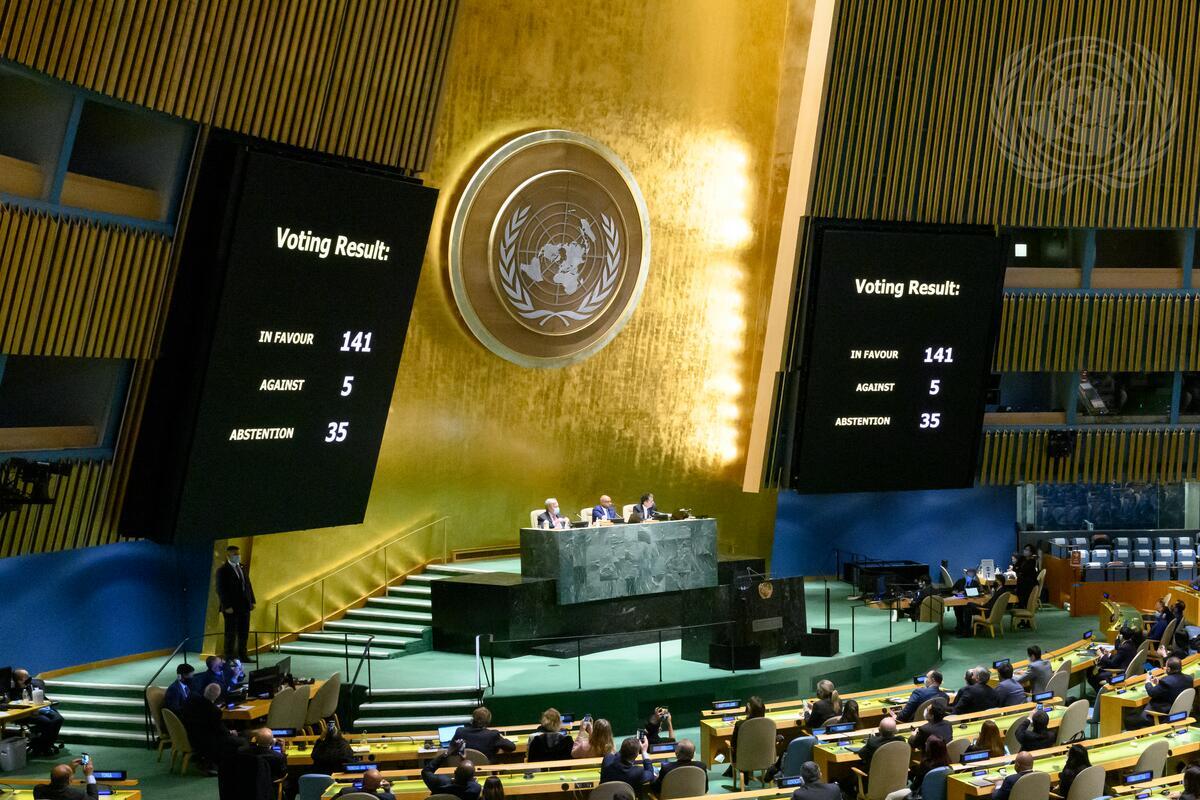
The U.N. General Assembly adopting a resolution demanding that Russia immediately end its military operations in Ukraine, March 2. (U.N. Photo/Loey Felipe)
By Humberto Márquez
in Caracas
Inter Press Service
 Numerous countries of the developing South are distancing themselves from the contenders in the war in Ukraine, using the debate on the conflict to underscore their independence and pave the way for a kind of new de facto non-alignment with regard to the main axes of world power.
Numerous countries of the developing South are distancing themselves from the contenders in the war in Ukraine, using the debate on the conflict to underscore their independence and pave the way for a kind of new de facto non-alignment with regard to the main axes of world power.
Meetings and votes on the conflict at the United Nations and in other forums, the search for support or neutrality and negotiations to cushion the impact of the economic crisis accentuated by the war are the spaces where the process of new alignment is taking place, according to analysts consulted by IPS.
Once Russian forces began their invasion of Ukraine on Feb. 24, the United States “activated and consolidated the trans-Atlantic alliance with Europe to confront Moscow, and has been seeking to draw in allies in Asia, but the situation there is more complicated,” said Argentine expert in negotiation and geopolitics, Andrés Serbin, speaking from Buenos Aires.
Serbin, author of works such as Eurasia and Latin America in a Multipolar World and chair of the academic Regional Economic and Social Research Coordinator, believes that many Asian countries do not want any alignment that would compromise their relationship with that continent’s powerhouse, China.
The rivalry between the United States and China – a growing trading partner and investor in numerous developing nations – fuels the distancing demonstrated by countries of the so-called Global South in the face of the conflict in Ukraine, a priority for the entire West.
Doris Ramirez, professor of International Relations at the Javeriana University in Colombia, argues that “now countries are better prepared to take a position and vote in international forums according to their interests and not according to ideological alignments.
“Emblematic cases are India, which is not going to break its excellent relations with Russia, its arms supplier for decades, or Saudi Arabia, now more interested in its relationship with China as the United States withdraws from the Middle East,” Ramirez observed from Bogota.
The struggle between nations that were ideologically aligned – with the United States or the then Soviet Union – led in 1961 to the creation of the Non-Aligned Movement (NAM), which sought to stay equally distant from the dominant blocs while promoting decolonization and the economic interests of the South.
Its promoters were prominent leaders of what was then called the Third World: Jawaharlal Nehru of India, Sukarno of Indonesia, Gamal Abdel Nasser of Egypt, Josip Broz “Tito” of Yugoslavia and Kwame Nkrumah of Ghana.
Over the years, the Non-Aligned Movement grew to 120 members, many of which were clearly aligned with one of the blocs and, although it still exists formally, its presence and relevance declined not only with the disappearance of its leaders, but also when the socialist bloc ceased to exist as such after the fall of the Berlin Wall in 1989 and the collapse of the Soviet Union.
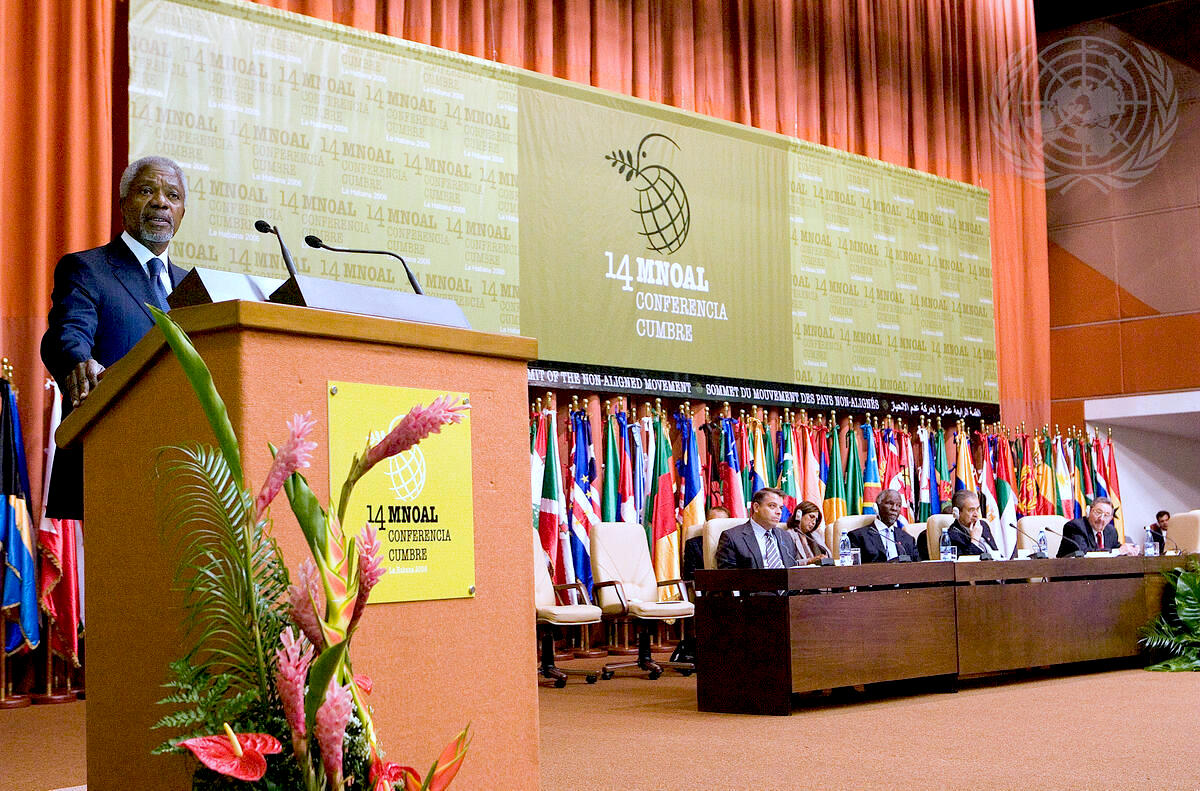
Sept. 15, 2006: U.N. Secretary-General Kofi Annan addressing the annual summit of the Non-Aligned Movement in Havana. (U.N. Photo/Eskinder Debebe)
The invasion of Ukraine was quickly addressed by the 193-member U.N. General Assembly, which on March 2 debated and approved a resolution condemning the invasion by Russian forces and demanding an immediate withdrawal of the troops, reiterating the principle of respect for the sovereignty and territorial integrity of all countries.
After 117 speeches, the vote – for, against, abstentions and absences – reflected on the display board at U.N. headquarters, became a first snapshot of the current “non-alignment” – the decision by many countries of the South not to subscribe to the positions of Moscow or its rivals in the West, led by the United States and the European Union.
The resolution received 141 votes in favor, five against (Belarus, North Korea, Eritrea, Russia and Syria), 35 abstentions and 12 absences.
“It is difficult for a country to support an invasion, it is not possible to find within the U.N. or international law a formula to justify it,” said former Venezuelan ambassador Oscar Hernández Bernalette, who has been a professor at the University of Cairo, in Egypt, and the Central University of Venezuela.
Therefore, “in order not to remain in the orbit of Moscow or Brussels or Washington, abstaining from voting is a way to demonstrate neutrality,” said Hernández Bernalette.
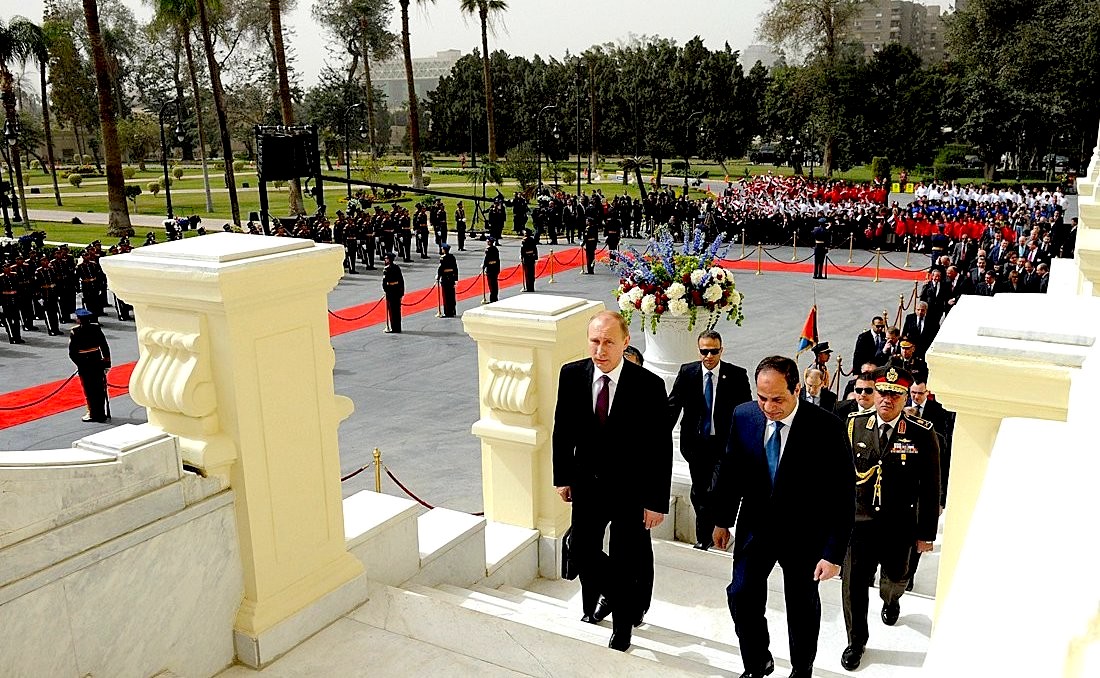
Russian President Vladimir Putin with Egyptian President Abdel Fattah el-Sisi at the Al-Qubba Palace in Tahrir Square, Cairo, Aug. 9, 2018. (Kremlin.ru, CC BY 4.0, Wikimedia Commons)
Of the 35 countries that abstained, 25 were from Africa, four from Latin America (Bolivia, Cuba, El Salvador and Nicaragua; Venezuela was unable to vote because of unpaid dues) and 14 from Asia, including countries with a strong global presence such as China, India, Pakistan and Iran, and former Soviet or socialist republics such as Laos, Mongolia and Vietnam.
A second resolution was discussed and approved at the Assembly on March 24, to demand that Russia, on humanitarian grounds in view of the loss of civilian lives and destruction of infrastructure, cease hostilities.
The vote was practically the same, with 140 votes in favor, the same five against and 38 abstentions, which this time also included Brunei, Guinea-Bissau and Uzbekistan.
UN Display Board Reflects New Non-Alignment
A third confrontation took place on April 7, to decide on the suspension of Russia from the U.N. Human Rights Council, made up of 47 states chosen by the General Assembly, which meets several times a year in Geneva.
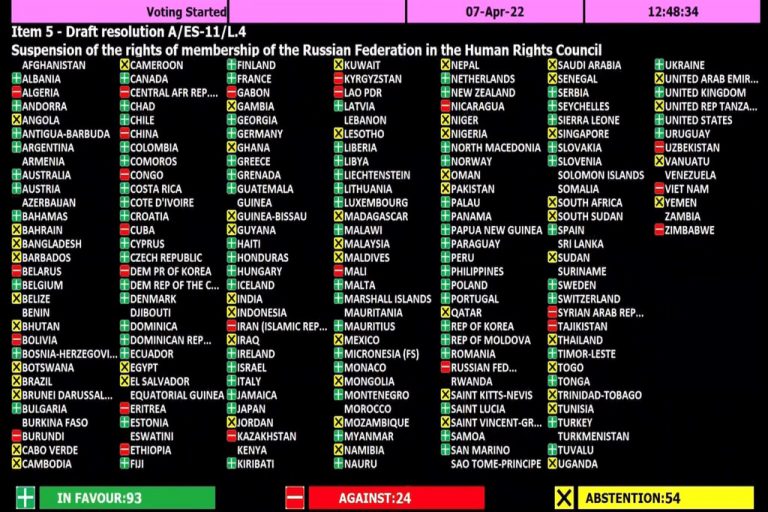
Display board at the UN General Assembly on the suspension of Russia from the Human Rights Council, with fewer countries voting with Western powers. (U.N.)
Moscow’s critics then drummed up 93 votes in the Assembly, but there were 24 against and 58 abstentions – evidence of independence and criticism of the web of alliances and institutions that guide international relations.
This time, countries that previously abstained, such as Russia’s neighbors in Central Asia, and Algeria, Bolivia, China, Cuba and Iran, voted against the proposal, and many of those who previously supported it, such as Barbados, Brazil, Kuwait, Mexico, Nigeria, Saudi Arabia, Senegal, Thailand and the United Arab Emirates, abstained.
Grouping, But in a Different Way
Bilateral and group forums and negotiations are being put on new tracks as the conflict in Ukraine drags on, with new proposals for understandings and alliances, and also new fears.
The impact of the war on the energy markets – as well as on food and finance – was immediate and created room for new realignments. Thus, the United States, as it watched the price of fuel rise at its gas stations, went in search of more oil supplies, from the Middle East to Venezuela.
Washington held two significant summits in recent weeks: one in Jakarta, with 10 members of the Association of Southeast Asian Nations (Asean) interested in sustaining their relationship with the U.S. while maintaining the ties woven with China, and another in Los Angeles: the ninth Summit of the Americas.
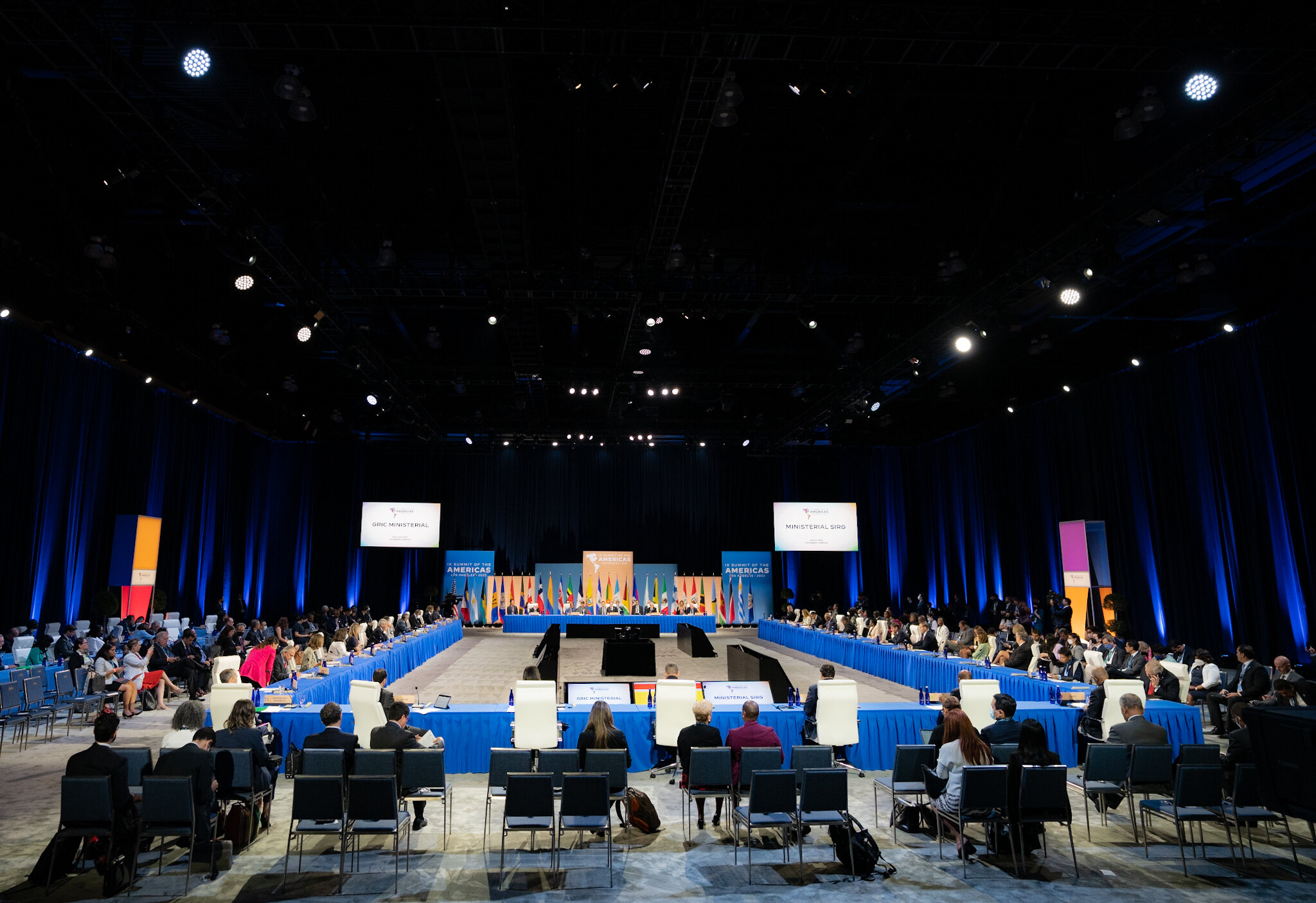
U.S. Secretary of State Antony Blinken leading a meeting at the Summit of the Americas in Los Angeles on June 8. (State Department, Freddie Everett)
This triennial meeting served as an opportunity for governments in this hemisphere to demonstrate their independent stance and refrain from automatic alignment with Washington. In addition to the three countries not invited (Cuba, Nicaragua and Venezuela), the heads of state of seven other countries decided not to attend, to protest the exclusion of their neighbors.
This snub marked the summit, in which Washington was barely able to cobble together an agreement on migration, with other issues pushed to the backburner, while Latin American countries, still lacking a united front, continue to develop their relations with rivals such as Russia and China.
In the Caribbean, in Asia and especially in Africa, the old relationship between former colonial powers such as France and the United Kingdom – which are confronting Moscow as partners in the Atlantic alliance – and their former colonies is also waning.
“The world no longer works that way,” said Hernandez Bernalette. “For many African or Asian countries, the relationship with new economic players such as China is much more important, in addition to the ties, including military ties, with Russia.”
However, the loose pieces in the international scaffolding also give rise to fears and problems that seriously affect the developing South, such as the possibility of an escalation of the conflict between China and Taiwan, or the grain shortages resulting from the war in Ukraine and affecting poor importers in Africa and Asia.
Serbin said that for the countries of the South, and in particular for those of Latin America, the conflict “offers opportunities, for the placement of energy or food exports for example, provided that the necessary agreements and balances with rival powers are maintained.”
“But if the confrontation escalates and spreads beyond Europe, it will be difficult to stay non-aligned. Our countries will then have to learn to navigate in troubled waters,” he concluded.
Humberto Márquez, who joined IPS in 1999, has been a journalist for more than 25 years, specializing in international news. He worked for 15 years with Agence France-Presse (AFP), 10 as assignment editor in Caracas, covering Venezuela, the Caribbean and the Guyanas. He also worked for more than five years in the international section of the Caracas newspaper El Nacional.
This article is from Inter Press Service.

It’s hard to see as much at stake in non-attendance at a meeting of the Americas as in an actual U.N. vote.
How likely would it be to see further pressures brought to bear, through institutions like the IMF, World Bank or WEF? Perhaps over an issue like debt restructuring or commodity contracts such as were used by the U.S. to pry Ukraine away from a deal with the Russian Federation and bring it into the fold? Look where that can lead.
What country of the global South could withstand being targeted as the next whipping boy of what appears to be an insanely aligned West? The U.S. already has compiled dossiers of a sort and employed financial chicanery against at least a couple of them.
Re. Ukraine & inflation blame game.
Today’s rising prices are “Bidenflation” and a direct result of the American Govt. refusal to negotiate, provide security guarantees, honor Secretary State Baker’s promise not to expand NATO eastward and its sponsorship of the 2014 Ukraine coup. Not much media coverage of Biden’s and Hunter’s corrupt dealings in Ukraine re. Burisma…
Support for yet another proxy war, sanctions and hypocritical demonization of Putin (after America killed 6 million in its wars, and W.’s freudian confession exposing our moral bankruptcy) have alienated even more people and accelerate the end of the US Empire; Pox Americana.
The US sought to be the only axis of the world, not just one of a few.
As so often with overextension, that might lead to a collapse, to far less than would have been sustainable without the attempted over reach.
NATO could fracture, between its eastern hotheads and the French/German/Italians. Whatever the US does, that fracture would leave it less influential.
The global system sabotaged by the US to impose sanctions will now re-organize, forced to do so, without the US.
The US has misjudged this badly, and it is difficult to see a path for the US to recover, consistent with anything acceptable to Team Biden or to any Republican alternative.
The US did not know it was taking the Samson Option, but it did.
I could not agree more Mark.
Could be that several recent articles here have helped advance a group, who share very similar views, towards a consensus. When we see evidence of other nations making plans as those outlined here by Mr. Humberto Marquez, with out being overly concerned with the U.S. position we see solid evidence that the U.S. president no longer owns the bully pulpit.
Recent U.S. presidents urged on by cries of U.S. exceptionalism from a run-away stock market and greatly “dumbed-down” U.S. public, continuously over played their cards, something that will work in a poker game but not in the game of foreign policy where “everyone is cheating” ( *Beau of the fifth Column ).
Again making a poker game play, the U.S. government doubled down, but everyone was cheating and as you point out finds itself in “quite a fix”.
What is they say now? “Play stupid games, win stupid prizes.
One is left to ask themself why is it the case when U.S. leadership has such a top heavy emphasis on collecting information of all types, continuously, that all 17 or 1700 security, intelligence organizations let this happen, if they did let it happen.
Best be strapping in real tight because currently we all are simply along for the ride. Why ? You ask.
I have an opinion, as usual.
Nothing makes sense here and for hasn’t for too long. Based on the limited information available that I can find in my opinion very powerful individuals in our country of corporate, political and governmental factions seem to be striving for widespread discord in our country. SEE Eric Greitens U.S. Senate campaign ad referring to bagging and tagging RINOS. Make your own evaluation of this incident.
Look, I’m not signing on for anything even remotely associated with wide spread civil unrest, by anyone or group, but we have a Missouri Republican openly advertising for such behavior.
Draw you own conclusions.
Thanks CN
Notice the US, in its usual domination of the rest of the globe, managed to have a motion about invasion, civilian deaths and destruction of infrastructure in Ukraine, NONE of which were true. The SMO specifically focused on demilitarisation, denazification (of the Ukraine which the USA had taken over for ten years or more) and avoided needless damage, and Russia waited patiently for 8 YEARS before finally being goaded into reaction.
The Colombian presidential elections and their probable impact on the upcoming Brazilian elections may have a huge impact on the subject matter of this article, and hopefully, help rupture the US led calcification of real diplomacy.
That is, in part, my hope. I’m also hoping that the US will go broke and have the US$ lose its status as prime reserve currency and as the default currency of international transactions. I’m an American but I am appalled and disgusted by the behavior of my country especially considering the power and privilege that we have by virtue of the US$. The US needs to be cut down to size so that it can be unum inter pares and not primus inter pares.